Politics
Duterte, Marcos and political dynasties in the Philippine presidential election – NPR
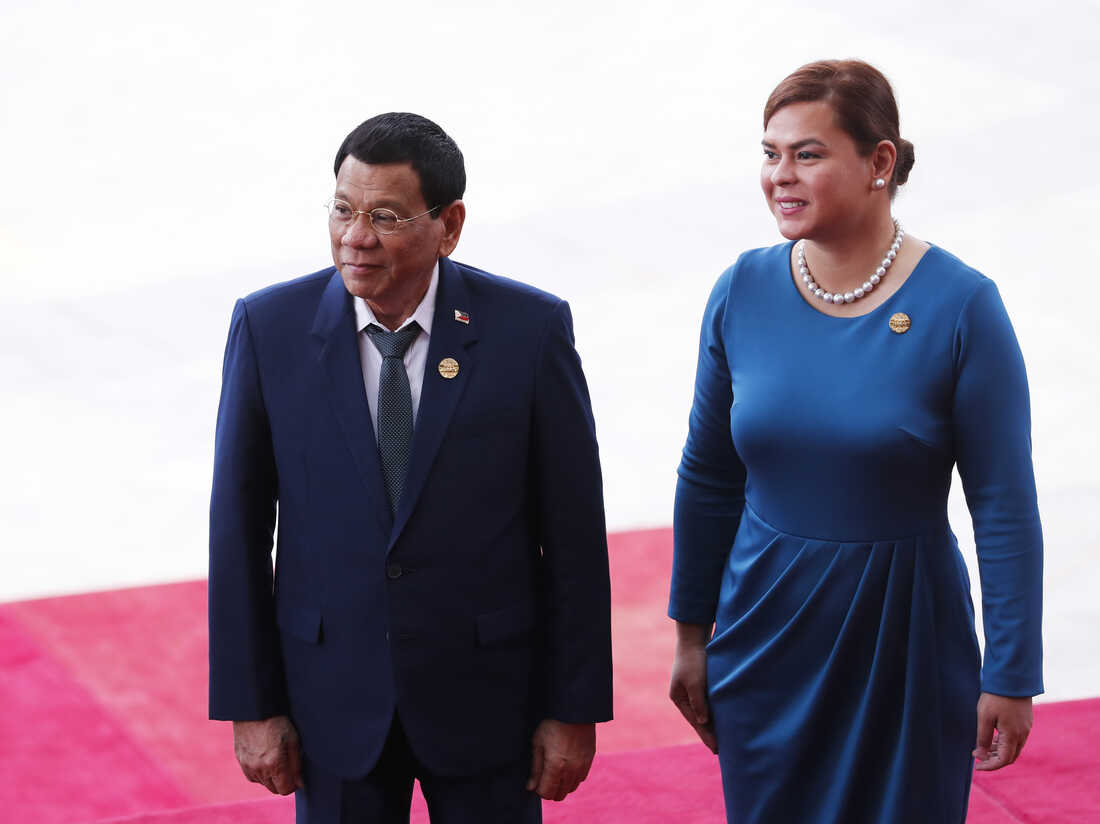
A foiled succession plan, sensational allegations, and a family feud at the pinnacle of power — these are the ingredients in what promises to be a riveting race to succeed outgoing Philippines President Rodrigo Duterte.
The no-holds-barred contest scheduled for May 2022 has already produced what some observers see as an unsettling alliance: the offspring of two presidents pairing off in an unprecedented bid to run the country.
Taking full advantage of their prominence, Ferdinand Marcos Jr., son of the late dictator Ferdinand Marcos Sr., has teamed up with Sara Duterte, daughter of President Rodrigo Duterte in the national election.
He is running for president in this dynastic duo, while she vies for vice president.
Are dynasties and celebrities narrowing democracy?
Political dynasties in the Philippines are nothing new.
Richard Heydarian, an expert on Philippine politics, says they are such a dominant feature in the country that between 70% and 90% of elected offices have been controlled by influential families.
But even by those standards, this Marcos-Duterte coupling takes powerful clan politics to a new level, says Philippine University political science professor Aries Arugay.
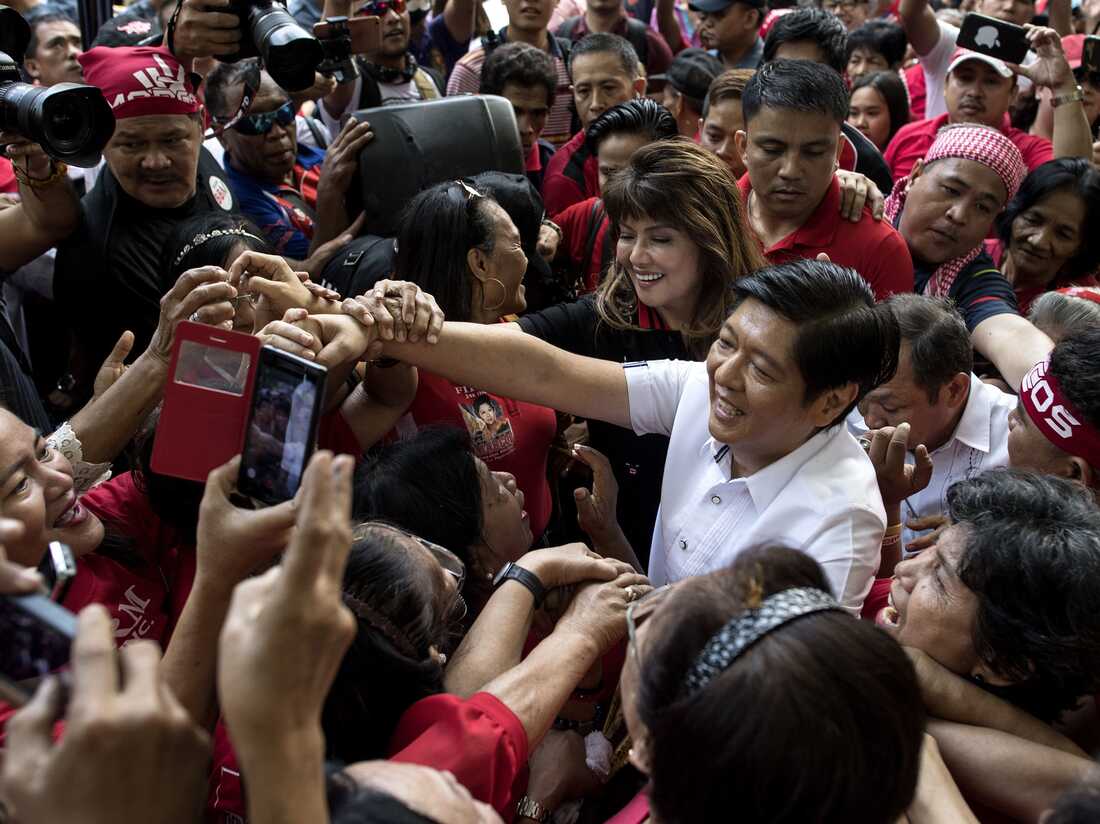

Ferdinand “Bongbong” Marcos Jr. is surrounded by supporters after attending the recount of votes in the 2016 vice presidential race at the Supreme Court. Marcos narrowly lost that contest to Leni Robredo, the current vice president.
Noel Celis/AFP via Getty Images
Noel Celis/AFP via Getty Images
Speaking at a recent online forum of the Center for Strategic and International Studies, Arugay says second generation dynasts are behaving like a “cartel”.
He says their calculus is as damaging as it is simple: “Why can’t we just share power, limit competition, and make sure that the next winners of the presidential and national elections come from us?”
Then there is the celebrity factor.
Heydarian notes a narrowing of democracy in the pairing of dynasties with the celebrity class, which includes former film stars, television personalities and sports figures. He says the two elite groups monopolize national office, putting elected office beyond the reach of a lot of ordinary Filipinos who he says may have the merit and passion to serve, but are effectively blocked from fully participating.
It makes a “mockery” of democracy, Heydarian says, but it’s also a trend that could be difficult to reverse.
“After all, in politics you need a certain degree of messaging, communications machinery and charisma,” he said. And, he added, especially in the age of social media, “It’s not for dull people.”
Running on a name, not a track record
Consider Manny Pacquiao.
His stardom as one of the legends of the boxing world has catapulted him into the race for president next year. He is currently a sitting senator and is in the running for the highest office not on the power of his record in the upper chamber marked by absenteeism, but on the strength of his career as the country’s most acclaimed athlete.
So prized have name recognition and celebrity status become in winning Philippine elections that observers worry it’s turning democracy into the preserve of the rich and well-connected.
Marcos is part and parcel of the phenomenon, according to Manila-based analyst Bob Herrera-Lim, who notes that his undistinguished career as a senator and congressman has been no barrier to his ambition for the presidency.
“[Marcos] is running on entitlement. He is running on the weaknesses of the system,” Herrera-Lim said.
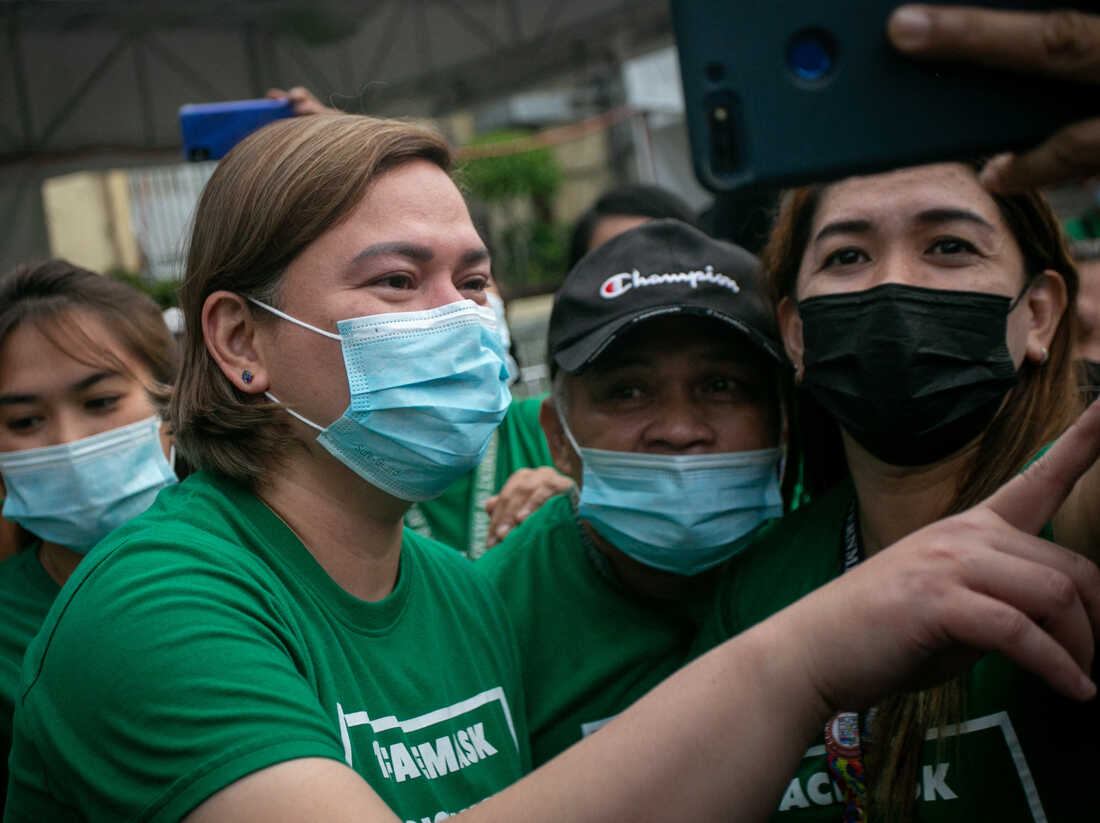

Sara Duterte poses for a selfie with city hall employees in Davao city, on the southern island of Mindanao.
Manman Dejeto/AFP via Getty Images
Manman Dejeto/AFP via Getty Images
Marcos’ vice presidential partner Sara Duterte is an accomplished politician, occupying the post her father held for decades as the mayor of Davao City, the third largest in the country. But the fact the 43-year-old First Daughter, whose work is little known outside Davao, led in a presidential opinion poll this past summer can only be put down to the power of a famous family name.
Revisionism, a PR campaign of distortion — and fond memories of the Marcos era
Bongbong Marcos is now making waves, rewriting the past and embellishing his family’s legacy.
It’s been 35 years since his father was ousted by a popular uprising, exiled, and exposed for rights abuses and kleptocracy.
Marcos Sr. is believed to have amassed up to $10 billion while in office, and now his son has been resuscitating the family’s image with a sophisticated social media campaign.
Marcos Jr. narrates seamlessly scored videos that cast his parents, Ferdinand and Imelda, as generous philanthropists, and his father as a great innovator who made possible new strains of rice and united the archipelago with infrastructure heralded as the “Golden Age” of the Philippines.
Critics decry what they call the revisionist history and systematic airbrushing of the sins of the father’s 20-year rule that turned the country into his personal fiefdom.
Marcos Sr. engaged in land-grabbing, bank-grabbing, and using dummies to hide acquisitions from public view, according to Professor Paul Hutchcroft of the Australian National University, who has written extensively on the political economy of the Philippines.
The late dictator dispensed special privileges to relatives, friends, and cronies, writes Ronald Mendoza, Dean of the School of Government at Ateno de Manila University, providing them access to the booty of the state, “even as the country failed to industrialize and was eventually plunged into debt and economic crises in the mid-1980s.”


Activists wear masks with anti-Marcos slogans during a rally in front of the Supreme court in Manila in 2016 as they await the high court’s decision on whether to allow the burial of the late Philippine dictator Ferdinand Marcos at the “Cemetery of Heroes”.
Ted Aljibe/AFP via Getty Images
Ted Aljibe/AFP via Getty Images
Yet, despite all of it, the Marcos family is not without its loyalists among both the elites and ordinary Filipinos.
At a small community market in central Manila, where fishmongers congregate amid aquariums and chopping blocks, vendors and shoppers talk about the Marcos era with a sense of nostalgia.
Chereelyn Dayondon, 49, says she likes how Marcos Sr. ran the country before and she wants that to come back. The single mother earns $80 a month directing traffic and worries that the cost of living is getting too high.
“It’s not going to be enough,” she says. “You never know, maybe Bongbong can change the Philippines. Let’s try him out.”
Meanwhile, fish seller Teodora Sibug-Nelval, 57, reminisces about the old Marcos era and memories of cheap food and law and order.
“I had a good life. I was able to send my sibling to school … I was able to buy a house,” she says.
In the pandemic, however, Sibug-Nelval lost her home and her vending stall. And now she wants her life back. She says she believes that if Marcos wins the election, “our lives will be better.”
Herrera-Lim also says that many Filipinos see a confusing, chaotic political situation: “There is no clear delineations, political parties don’t work for our benefit, we are looking for order.”
And that, he says, is what Marcos is offering.
“Bongbong Marcos is saying that during his father’s time, there was this order. There was peace in the country, which again, is a myth,” he says.
The challenger to the dynasty
Leni Robredo is the current vice president of the Philippines and a liberal progressive.
A lawyer by training, Robredo co-authored an anti-dynasty bill when she served as a member of the Philippine House of Representatives.
In the Philippines, the vice president and president are elected separately and Robredo is on the opposite end of the political spectrum from President Duterte, with whom she has repeatedly sparred over human rights, the handling of the pandemic and Duterte’s close ties with China.
Among the many candidates for president, including a former police chief, the mayor of Manila and Duterte’s closest aide, Robredo appears to represent the greatest challenge to Bongbong Marcos.
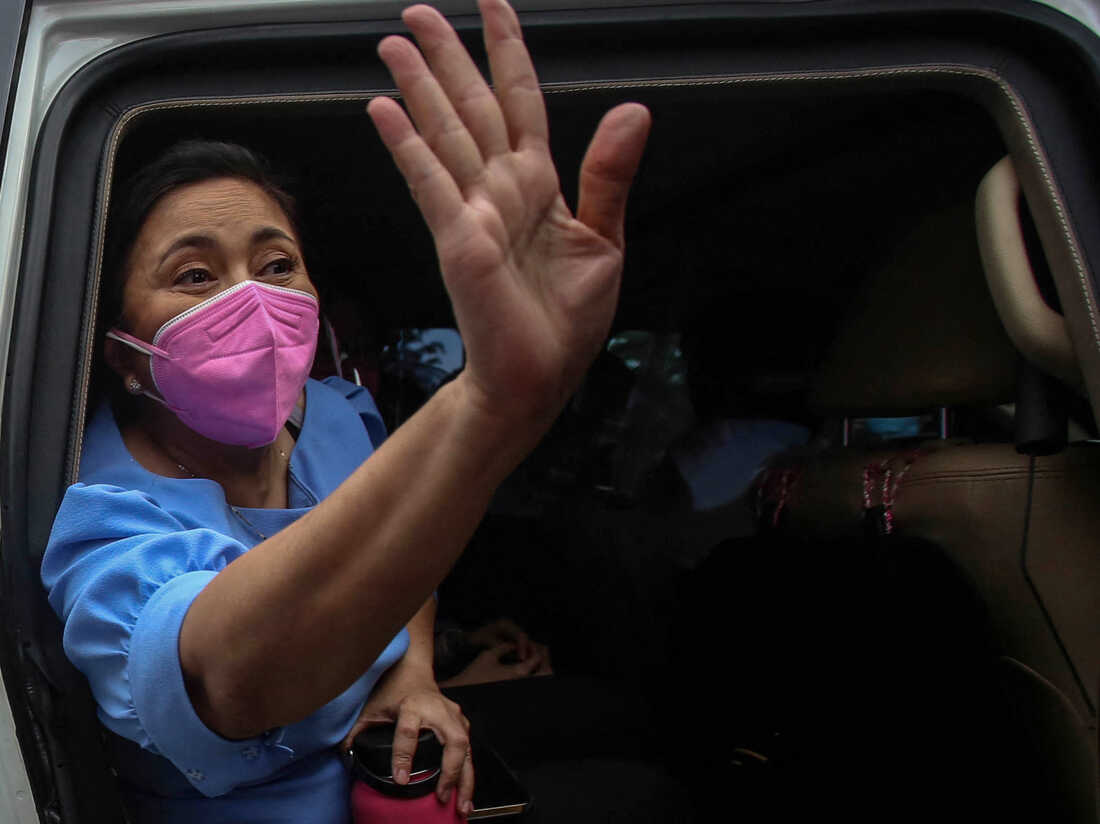

Philippine Vice President Leni Robredo gestures to a crowd of supporters in Manila on October 7, 2021, the day she filed her candidacy for the 2022 presidential race.
Jam Sta Rosa/AFP via Getty Images
Jam Sta Rosa/AFP via Getty Images
Robredo defeated Marcos Jr. for vice president in 2016, and now she has pledged that if she wins the top office, she will recover the Marcos family’s plundered riches.
Alluding to Marcos’ perceived popularity, Robredo told a news conference last weekend that it was “sad that the people allow themselves to be fooled” into believing Marcos would save the country when the family’s ill-gotten wealth “was the reason they are poor.”
Yet Robredo may need more than tough rhetoric and moral rectitude.
Marites Vitug, the editor-at-large for the online news site Rappler, whose CEO won this year’s Nobel Peace Prize, said the country was witnessing the “rehabilitation of the Marcos dynasty.” Young people were especially susceptible to the Marcos rebranding, she said, because there were no standard history textbooks in the Philippines that explained the Marcos martial law years.
“I was shocked to hear from some millennials that this was never discussed in class,” she said.
Vitug said the odd teacher or professor may present it, but it was not systematic.
“It should have been required reading,” she said.
Political economist Calixto Chikiamco adds that the revived Marcos family fortunes represent a counter-revolution to the one that ousted Marcos Sr. in 1986. That so-called Yellow Revolution was a model that Chikiamco says has failed to deliver genuine change.
“Because our politics remain dysfunctional, our economy is still not doing so well, a quarter of the workforce is unemployed … still a large number of people go abroad to seek better opportunities. So it is a revolt against their present situation,” he said.
“That’s the reason the Marcoses are making a comeback.”
The Duterte dynasty is a house divided
The campaign promises to be one of the Philippines’ most bitterly fought contests in years, not least because the Marcos-Duterte tie-up has not won the blessing of Sara Duterte’s father.
Rodrigo Duterte did make the controversial decision to allow the late dictator’s remains to be moved to the “Cemetery of Heroes,” a decision confirmed by the Supreme Court. But the once-friendly relations between Rodrigo Duterte and Bongbong Marcos have frayed, possibly beyond repair.
Duterte had wanted his daughter to seek the presidency, not play second fiddle, to provide him protection from the International Criminal Court investigating his violent anti-drug war. The probe has been suspended for a procedural review, but court watchers expect the case of alleged crimes against humanity to resume. Meanwhile, Chikiamco says while Sara may talk of continuing her father’s policies, by declining to run for the top job, she has gone her own way.
“The daughter is fiercely independent and didn’t want to be under the thumb of President Duterte. And also she could not perhaps tolerate the president’s men,” Chikiamco said.


A grandmother and her grandchild light a candle beside mock chalk figure representing an extra judicial killing victim during a prayer rally condemning the government’s war on drugs in Manila in 2017.
Noel Celis/AFP via Getty Images
Noel Celis/AFP via Getty Images
Herrera-Lim adds that daughter and father apparently “did not see eye to eye on many things related to the family or on the governance of Davao.”
Fundamentally, though, Herrera-Lim says President Duterte doesn’t trust Bongbong Marcos to shield him from ICC prosecutors.
“On these matters, family is very important,” he said.
And even if there were such a bargain between the two men, Herrera says Duterte would worry it might not hold.
In what analysts regard as a means to protect himself, Duterte is making a bid for a seat in the Senate in the 2022 election.
One authoritative poll shows Marcos the early frontrunner to succeed him. But not, it seems, if President Duterte has anything to say about it.
He ignited a stir earlier this month by declaring in a televised address that an unnamed candidate for president uses cocaine.
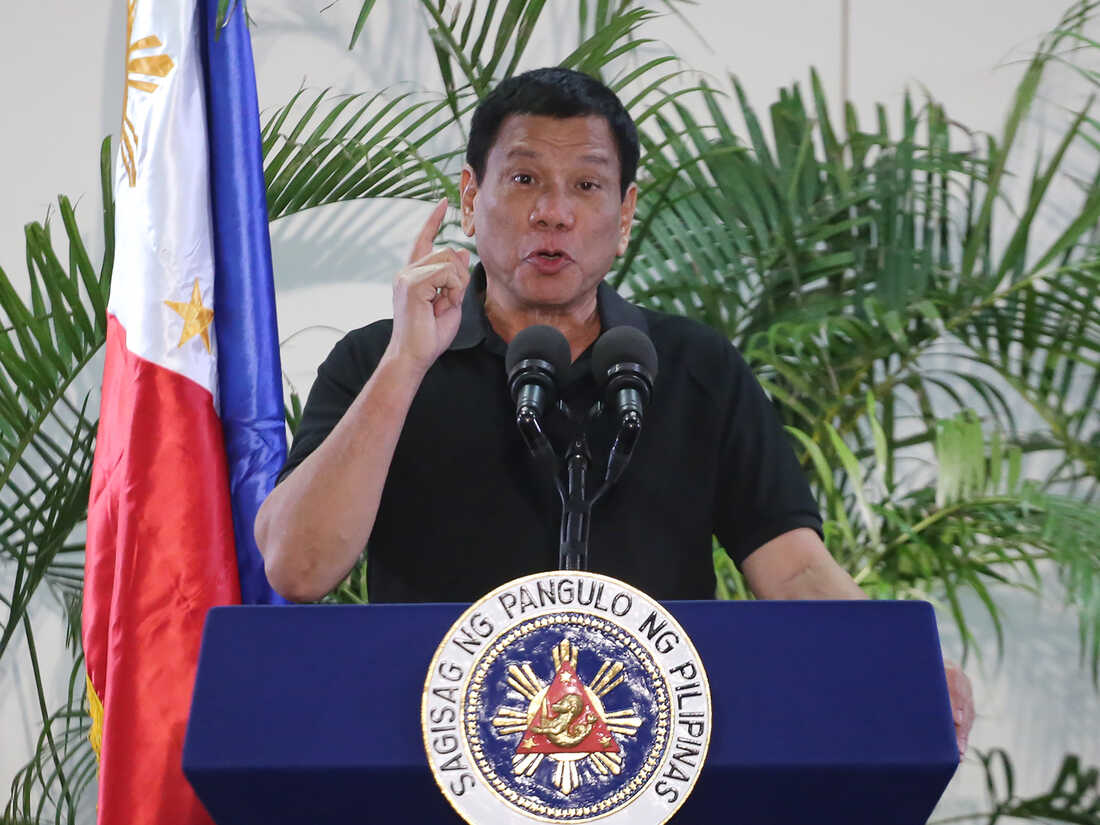

Philippines President Rodrigo Duterte.
AFP/AFP via Getty Images
AFP/AFP via Getty Images
Without identifying who, he said the offender was a “very weak leader” and that “he might win hands down.”
Marcos took a drug test this past week, saying he was clean. Other candidates hurriedly lined up to clear their name.
Marcos is also under attack by groups eager to have him disqualified from running at all. The Election Commission is reviewing four separate petitions challenging his candidacy. At least one charges that Marcos misrepresented his eligibility to seek the presidency by stating he had no criminal conviction that would bar him from office. Petitioners argue that his 1995 conviction for failing to pay taxes for several years in the 1980s ends his bid for the presidency.
The Election Commission announced no ballots will be printed until the petitions are decided.
The campaign that officially begins in February is already generating drama enough for some to lament that the race for president is fast becoming a “political circus.”
But Richard Heydarian says circuses are not always the worst thing. “Sometimes,” he says, “they can produce a magical outcome. Let’s see.”
Politics
Iran news: Canada, G7 urge de-escalation after Israel strike – CTV News


Canada called for “all parties” to de-escalate rising tensions in the Mideast following an apparent Israeli drone attack against Iran overnight.
G7 foreign ministers, including Canada’s, and the High Representative for the European Union released a public statement Friday morning. The statement condemned Iran’s “direct and unprecedented attack” on April 13, which saw Western allies intercept more than 100 bomb-carrying drones headed towards Israel, the G7 countries said.
Prior to the Iranian attack, a previous airstrike, widely blamed on Israel, destroyed Iran’s consulate in Syria, killing 12 people including two elite Iranian generals.
“I join my G7 colleagues in urging all parties to work to prevent further escalation,” wrote Foreign Affairs Minister Melanie Joly in a post on X Friday.
More details to come.
Politics
Politics Briefing: Labour leader targets Poilievre, calls him 'anti-worker politician' – The Globe and Mail

Hello,
Pierre Poilievre is a fraud when it comes to empowering workers, says the president of Canada’s largest labour organization.
Bea Bruske, president of the Canadian Labour Congress, targeted the federal Conservative Leader in a speech in Ottawa today as members of the labour movement met to develop a strategic approach to the next federal election, scheduled for October, 2025.
“Whatever he claims today, Mr. Poilievre has a consistent 20-year record as an anti-worker politician,” said Bruske, whose congress represents more than three million workers.
She rhetorically asked whether the former federal cabinet minister has ever walked a picket line, or supported laws to strengthen workers’ voices.
“Mr. Poilievre sure is fighting hard to get himself power, but he’s never fought for worker power,” she said.
“We must do everything in our power to expose Pierre Poilievre as the fraud that he is.”
The Conservative Leader, whose party is running ahead of its rivals in public-opinion polls, has declared himself a champion of “the common people,” and been courting the working class as he works to build support.
Mr. Poilievre’s office today pushed back on the arguments against him.
Sebastian Skamski, media-operations director, said Mr. Poilievre, unlike other federal leaders, is connecting with workers.
In a statement, Skamski said NDP Leader Jagmeet Singh has sold out working Canadians by co-operating with the federal Liberal government, whose policies have created challenges for Canadian workers with punishing taxes and inflation.
“Pierre Poilievre is the one listening and speaking to workers on shop floors and in union halls from coast to coast to coast,” said Mr. Skamski.
Prime Minister Justin Trudeau and Mr. Singh are scheduled to speak to the gathering today. Mr. Poilievre was not invited to speak.
Asked during a post-speech news conference about the Conservative Leader’s absence, Bruske said the gathering is focused on worker issues, and Poilievre’s record as an MP and in government shows he has voted against rights, benefits and wage increases for workers.
“We want to make inroads with politicians that will consistently stand up for workers, and consistently engage with us,” she said.
This is the daily Politics Briefing newsletter, written by Ian Bailey. It is available exclusively to our digital subscribers. If you’re reading this on the web, subscribers can sign up for the Politics newsletter and more than 20 others on our newsletter signup page. Have any feedback? Let us know what you think.
TODAY’S HEADLINES
Pierre Poilievre’s top adviser not yet contacted in Lobbying Commissioner probe: The federal Lobbying Commissioner has yet to be in touch with Jenni Byrne as the watchdog probes allegations of inappropriate lobbying by staff working both in Byrne’s firm and a second one operating out of her office.
Métis groups will trudge on toward self-government as bill faces another setback: Métis organizations in Ontario and Alberta say they’ll stay on the path toward self-government, despite the uncertain future of a contentious bill meant to do just that.
Liberals buck global trend in ‘doubling down’ on foreign aid, as sector urges G7 push: The federal government pledged in its budget this week to increase humanitarian aid by $150-million in the current fiscal year and $200-million the following year.
Former B.C. finance minister running for the federal Conservatives: Mike de Jong says he will look to represent the Conservatives in Abbotsford-South Langley, which is being created out of part of the Abbotsford riding now held by departing Tory MP Ed Fast.
Ottawa’s new EV tax credit raises hope of big new Honda investment: The proposed measure would provide companies with a 10-per-cent rebate on the costs of constructing new buildings to be used in the electric-vehicle supply chain. Story here.
Sophie Grégoire Trudeau embraces uncertainty in new memoir, Closer Together: “I’m a continuous, curious, emotional adventurer and explorer of life and relationships,” Grégoire Trudeau told The Globe and Mail during a recent interview. “I’ve always been curious and interested and fascinated by human contact.”
TODAY’S POLITICAL QUOTES
“Sometimes you’re in a situation. You just can’t win. You say one thing. You get one community upset. You say another. You get another community upset.” – Ontario Premier Doug Ford, at a news conference in Oakville today, commenting on the Ontario legislature Speaker banning the wearing in the House of the traditional keffiyeh scarf. Ford opposes the ban, but it was upheld after the news conference in the provincial legislature.
“No, I plan to be a candidate in the next election under Prime Minister Trudeau’s leadership. I’m very happy. I’m excited about that. I’m focused on the responsibilities he gave me. It’s a big job. I’m enjoying it and I’m optimistic that our team and the Prime Minister will make the case to Canadians as to why we should be re-elected.” – Public Safety Minister Dominic LeBlanc, before Question Period today, on whether he is interested in the federal Liberal leadership, and succeeding Justin Trudeau as prime minister.
THIS AND THAT
Today in the Commons: Projected Order of Business at the House of Commons, April. 18, accessible here.
Deputy Prime Minister’s Day: Private meetings in Burlington, Ont., then Chrystia Freeland toured a manufacturing facility, discussed the federal budget and took media questions. Freeland then travelled to Washington, D.C., for spring meetings of the International Monetary Fund and the World Bank Group. Freeland also attended a meeting of the Five Eyes Finance Ministers hosted by U.S. Treasury Secretary Janet Yellen, and held a Canada-Ukraine working dinner on mobilizing Russian assets in support of Ukraine.
Ministers on the Road: Foreign Affairs Minister Mélanie Joly is on the Italian island of Capri for the G7 foreign ministers’ meeting. Heritage Minister Pascale St-Onge, in the Quebec town of Farnham, made an economic announcement, then held a brief discussion with agricultural workers and took media questions. Privy Council President Harjit Sajjan made a federal budget announcement in the Ontario city of Welland. Families Minister Jenna Sudds made an economic announcement in the Ontario city of Belleville.
Commons Committee Highlights: Treasury Board President Anita Anand appeared before the public-accounts committee on the auditor-general’s report on the ArriveCan app, and Karen Hogan, Auditor-General of Canada, later appeared on government spending. Crown-Indigenous Relations Minister Gary Anandasangaree appears before the status-of-women committee on the Red Dress Alert. Competition Bureau Commissioner Matthew Boswell and Yves Giroux, the Parliamentary Budget Officer, appeared before the finance committee on Bill C-59. Former Prince Edward Island premier Robert Ghiz, now the president and chief executive officer of the Canadian Telecommunications Association, is among the witnesses appearing before the human-resources committee on Bill C-58, An act to amend the Canada Labour Code. Caroline Maynard, Canada’s Information Commissioner, appears before the access-to-information committee on government spending. Michel Patenaude, chief inspector at the Sûreté du Québec, appeared before the public-safety committee on car thefts in Canada.
In Ottawa: Governor-General Mary Simon presented the Governor-General’s Literary Awards during a ceremony at Rideau Hall, and, in the evening, was scheduled to speak at the 2024 Indspire Awards to honour Indigenous professionals and youth.
PRIME MINISTER’S DAY
Justin Trudeau met with Ottawa Mayor Mark Sutcliffe at city hall. Sutcliffe later said it was the first time a sitting prime minister has visited city hall for a meeting with the mayor. Later, Trudeau delivered remarks to a Canada council meeting of the Canadian Labour Congress.
LEADERS
Bloc Québécois Leader Yves-François Blanchet held a media scrum at the House of Commons ahead of Question Period.
Conservative Leader Pierre Poilievre attends a party fundraising event at a private residence in Mississauga.
Green Party Leader Elizabeth May attended the House of Commons.
NDP Leader Jagmeet Singh, in Ottawa, met with Saskatchewan’s NDP Leader, Carla Beck, and, later, Ken Price, the chief of the K’ómoks First Nation,. In the afternoon, he delivered a speech to a Canadian Labour Congress Canadian council meeting.
THE DECIBEL
On today’s edition of The Globe and Mail podcast, Sanjay Ruparelia, an associate professor at Toronto Metropolitan University and Jarislowsky Democracy Chair, explains why India’s elections matter for democracy – and the balance of power for the rest of the world. The Decibel is here.
PUBLIC OPINION
Declining trust in federal and provincial governments: A new survey finds a growing proportion of Canadians do not trust the federal or provincial governments to make decisions on health care, climate change, the economy and immigration.
OPINION
On Haida Gwaii, an island of change for Indigenous land talks
“For more than a century, the Haida Nation has disputed the Crown’s dominion over the land, air and waters of Haida Gwaii, a lush archipelago roughly 150 kilometres off the coast of British Columbia. More than 20 years ago, the First Nation went to the Supreme Court of Canada with a lawsuit that says the islands belong to the Haida, part of a wider legal and political effort to resolve scores of land claims in the province. That case has been grinding toward a conclusion that the B.C. government was increasingly convinced would end in a Haida victory.” – The Globe and Mail Editorial Board.
The RCMP raid the home of ArriveCan contractor as Parliament scolds
“The last time someone was called before the bar of the House of Commons to answer MPs’ inquiries, it was to demand that a man named R.C. Miller explain how his company got government contracts to supply lights, burners and bristle brushes for lighthouses. That was 1913. On Wednesday, Kristian Firth, the managing partner of GCStrategies, one of the key contractors on the federal government’s ArriveCan app, was called to answer MPs’ queries. Inside the Commons, it felt like something from another century.” – Campbell Clark
First Nations peoples have lost confidence in Thunder Bay’s police force
“Thunder Bay has become ground zero for human-rights violations against Indigenous Peoples in Canada. Too many sudden and suspicious deaths of Indigenous Peoples have not been investigated properly. There have been too many reports on what is wrong with policing in the city – including ones by former chair of the Truth and Reconciliation Commission Murray Sinclair and former Toronto Police board chair Alok Mukherjee, and another one called “Broken Trust,” in which the Office of the Independent Police Review Director said the Thunder Bay Police Service (TBPS) was guilty of “systemic racism” in 2018. – Tanya Talaga.
The failure of Canada’s health care system is a disgrace – and a deadly one
“What can be said about Canada’s health care system that hasn’t been said countless times over, as we watch more and more people suffer and die as they wait for baseline standards of care? Despite our delusions, we don’t have “world-class” health care, as our Prime Minister has said; we don’t even have universal health care. What we have is health care if you’re lucky, or well connected, or if you happen to have a heart attack on a day when your closest ER is merely overcapacity as usual, and not stuffed to the point of incapacitation.” – Robyn Urback.
Got a news tip that you’d like us to look into? E-mail us at tips@globeandmail.com. Need to share documents securely? Reach out via SecureDrop.
Politics
GOP strategist reacts to Trump’s ‘unconventional’ request – CNN


GOP strategist reacts to Trump’s ‘unconventional’ request
Donald Trump’s campaign is asking Republican candidates and committees using the former president’s name and likeness to fundraise to give at least 5% of what they raise to the campaign, according to a letter obtained by CNN. CNN’s Steve Contorno and Republican strategist Rina Shah weigh in.
-
Media20 hours ago
DJT Stock Rises. Trump Media CEO Alleges Potential Market Manipulation. – Barron's
-
Media22 hours ago
Trump Media alerts Nasdaq to potential market manipulation from 'naked' short selling of DJT stock – CNBC
-
Investment20 hours ago
Private equity gears up for potential National Football League investments – Financial Times
-
Real eState12 hours ago
Botched home sale costs Winnipeg man his right to sell real estate in Manitoba – CBC.ca
-
News19 hours ago
Canada Child Benefit payment on Friday | CTV News – CTV News Toronto
-
Business21 hours ago
Gas prices see 'largest single-day jump since early 2022': En-Pro International – Yahoo Canada Finance
-
Art24 hours ago
Enter the uncanny valley: New exhibition mixes AI and art photography – Euronews
-



 Politics21 hours ago
Politics21 hours agoIran news: Canada, G7 urge de-escalation after Israel strike – CTV News






